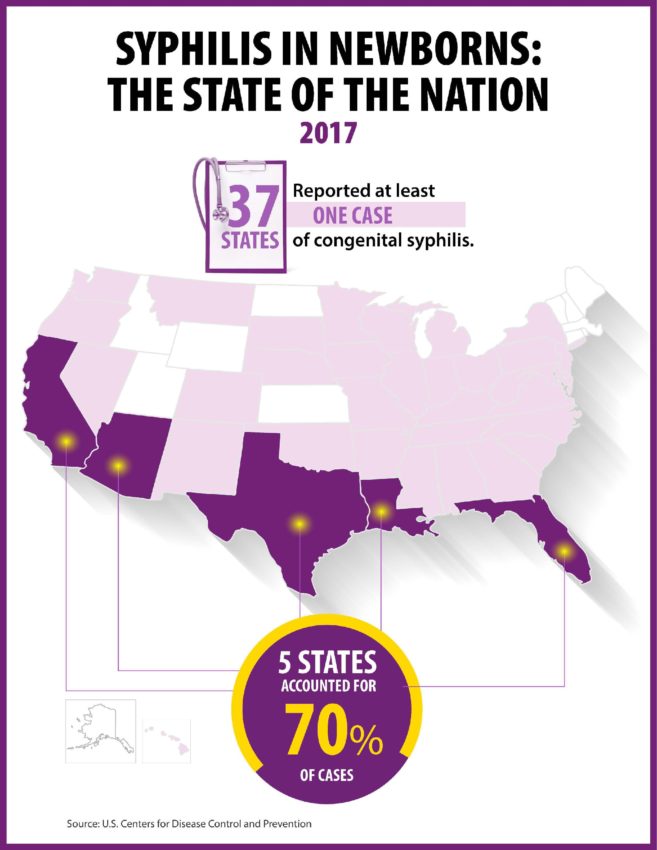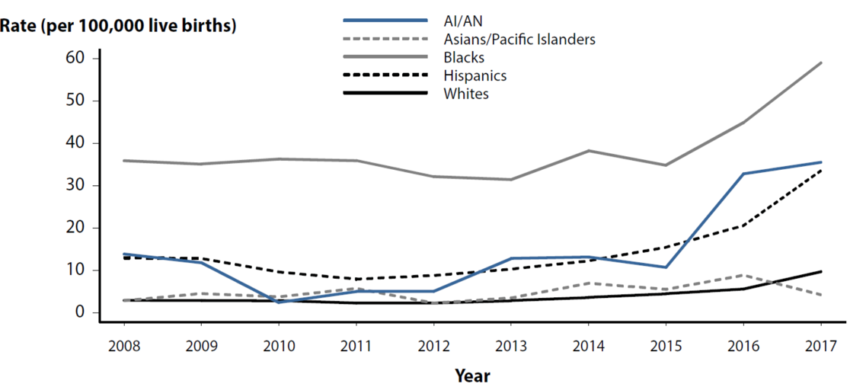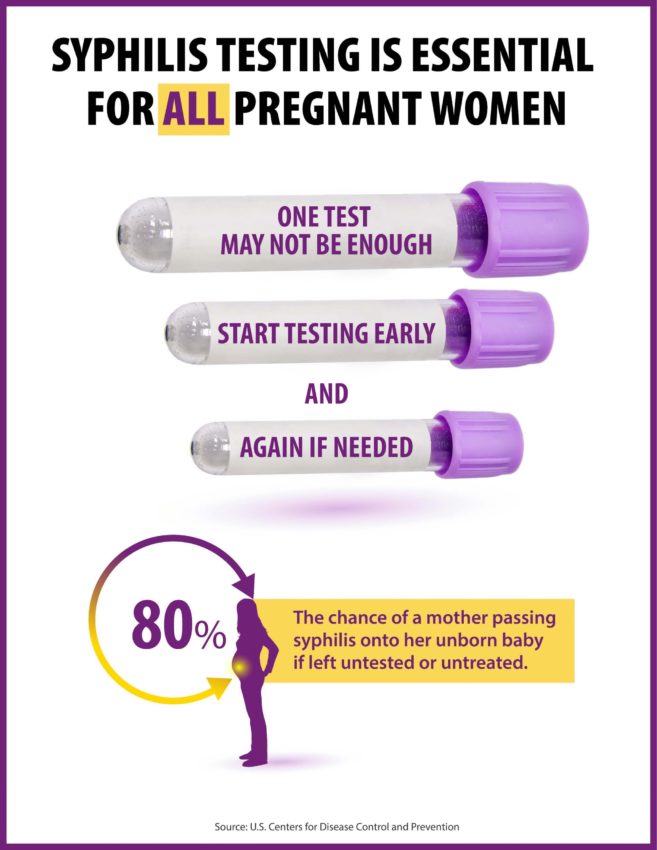
Share On Social!
Syphilis cases passed from pregnant women to newborns have doubled in four years, reaching a 20-year high, according to a new report from the Centers for Disease Control and Prevention (CDC).
Cases in newborns jumped from 362 in 2013 to 918 in 2017.
Cases were reported in 37 states. Louisiana had the most with 93.4 cases for every 100,000 births.
Four of the five other states with the most cases have largely Latino populations—–California (39% Latino), Texas (39%), Arizona (31%), and Florida (24%).
“When passed to a baby, syphilis can result in miscarriage, newborn death, and severe lifelong physical and mental health problems,” said Dr. Jonathan Mermin of the CDC. “No parent should have to bear the death of a child when it would have been prevented with a simple test and safe treatment.”
Syphilis and Other STDs among Latinos
 Latinos face many disparities in sexually transmitted diseases (STDs).
Latinos face many disparities in sexually transmitted diseases (STDs).
For example:
- Latinos have rising syphilis rates.
- They have the second-highest chlamydia and gonorrhea rates among minority populations in Oregon.
- AIDS case rate among Latinos was 3.3 times higher than for Whites.
Implications of risky environments and migration-driven factors increased prevalence of HIV and STDs. Social isolation and networks also add to the issue.

Syphilis and Its Effects
Syphilis is a bacterial infection, easily cured with penicillin.
But women with untreated syphilis can pass it to fetuses during pregnancy, or to their babies during birth.
If transmitted, it can cause miscarriage, stillbirth or newborn death. Syphilis caused 77 stillbirths or newborn deaths in 2017, the CDC reported.
Babies born with syphilis face a greater risk of brain damage and other serious issues.
David Harvey, executive director of the National Coalition of STD Directors, called the surge in cases “a systemic failure.”
“We are failing pregnant women in the United States,” Harvey said. “We are seeing almost 1,000 babies born with syphilis.”
Protect Yourself Against Syphilis
The CDC recommends every pregnant woman get screened early in her pregnancy. This can enable treatment and prevent fetal infection and possible stillbirth.
In areas or states where syphilis rates or congenital syphilis rates are high, women should also get screened repeatedly—at 28 to 32 weeks of pregnancy and at delivery.
“If you’re pregnant, have syphilis and get treated for syphilis before 26 weeks of pregnancy, your baby is probably safe from the infection,” according to the March of Dimes.
 March of Dimes also makes these recommendations:
March of Dimes also makes these recommendations:
- Don’t have sex. This is the best way to protect yourself from STIs, including syphilis.
- If you do have sex, have safe sex. If you’re not sure if your partner has an STI, use a barrier method of birth control. Barrier methods include male and female condoms and dental dams.
- Go to all your prenatal care checkups, even if you’re feeling fine. Many cases of syphilis happen in women who don’t get regular prenatal care. At your prenatal care checkups, your provider asks you questions to see if you may be at risk for syphilis and other infections that can affect your pregnancy. If you’re at risk for syphilis, your provider gives you a blood test to see if you have the infection.
- Get tested and treated. If you think you may have syphilis, tell your provider right away. He can test you for syphilis and begin treatment if you’re infected. The sooner you’re treated, the less likely you and your baby are to have complications.
- Ask your partner to get tested and treated for syphilis. If you get treated for syphilis, you’re no longer infected. But if your partner is infected, you can get infected again. This is called reinfection. Ask your partner to get tested and treated to protect you from infection and reinfection.
Check out these organizations also are trying to boost health for pregnant women.
Sylvia Lopez’s nurse home visit program connects pregnant Latinos to health services.
Kori Eberle coordinates home visits, screenings, and parenting and health education for vulnerable women from pregnancy to their baby’s second birthday as part of the San Antonio Metropolitan Health District Healthy Start program in San Antonio (63.2% Latino population). They also started community baby showers to connect women to health resources and prenatal care.
“We follow a traditional baby shower concept with games and prizes, and we try to pack as much education into the agenda as we can, and connect families to ongoing resources in their neighborhood,” Eberle said.
Explore More:
Healthy Families & SchoolsBy The Numbers
142
Percent
Expected rise in Latino cancer cases in coming years



